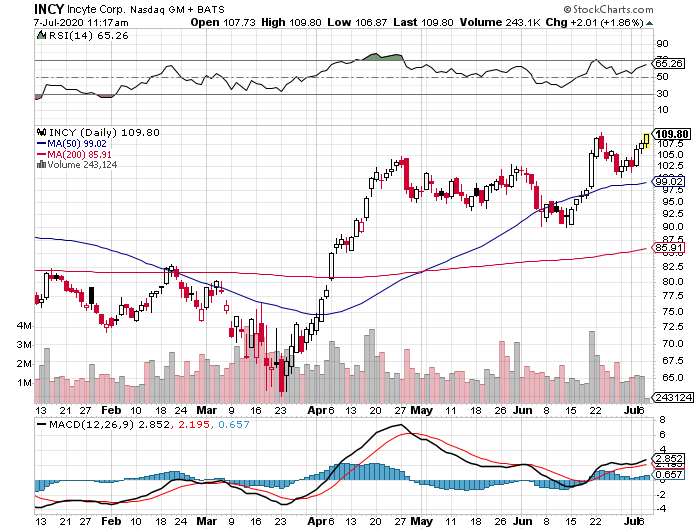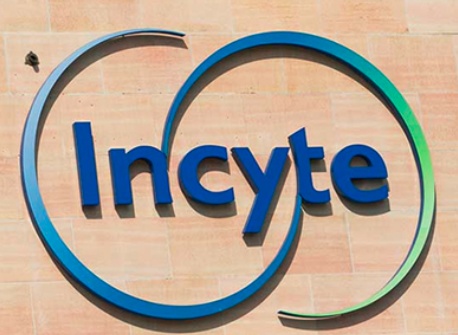The Billions in Cross-Prescribing for Covid-19
Although there is no obvious connection between cancer and viral infections, Delaware-based biotechnology and pharmaceutical company Incyte (INCY) is optimistic that its blood cancer treatment Jakafi can offer a solution to the COVID-19 pandemic.
The research on Jakafi’s efficacy against the severe acute respiratory syndrome coronavirus 2 (SARS-CoV-2) started in April. It’s rooted in the premise that since the drug works by inhibiting the immune cells, then it can be effective in suppressing the body’s response to the coronavirus attack.
This is promising considering that the immune system bears the brunt of the most deleterious effects of the virus, with the patients’ own cells attacking their bodies that subsequently leads to death.
Jakafi received its first approval back in 2011. While it was discovered and marketed by Incyte in the US, this drug is sold by Novartis (NVS) outside the country under the name Jakavi.
Apart from Incyte, other companies working on a similar strategy of using an autoimmune disease drug to treat COVID-19 complications include Regeneron (REGN), Sanofi (SNY), and Roche Holding’s (RHHBY).
Outside its COVID-19 efforts, Incyte is also looking into expanding the market for Jakafi.
In 2019, Jakafi sales grew by 21% to reach $1.7 billion. Revenues were derived from the drug’s three approved uses, namely, myelofibrosis, polycythemia vera, and acute graft-versus-host disease.
For 2020, Incyte estimates sales to grow to hit $1.8 billion to $1.95 billion, paving the way for Jakafi to become a $3 billion brand.
So far, Incyte is hoping to achieve this by expanding Jakafi’s indications to include atopic dermatitis. The goal is to submit this for approval by the fourth quarter of the year.
Another COVID-19-related effort linked to the company is testing rheumatoid arthritis drug Olumiant, which Eli Lilly (LLY) licensed from Incyte.
Eli Lilly is investigating this drug in partnership with the National Institute of Allergy and Infectious Diseases (NIAID) hoping Olumiant can be used to treat critically ill COVID-19 patients.
Other companies looking into the same plan are Roche with Actemra and AstraZeneca (AZN) via Calquence.
Aside from that, NIAID is also looking into the efficacy of Olumiant when combined with Gilead Sciences’ (GILD) lead COVID-19 candidate Remdesivir.
Looking into Incyte’s earnings history, it’s safe to say that the company is on its way to a brighter financial future.
Last year, Incyte’s total global revenue reached $2.16 billion, showing a 15% increase from 2018.
Aside from its best-selling drug Jakafi, Incyte has another potential blockbuster in its portfolio in the form of blood cancer treatment Iclusig. This drug, which the company licensed from Ariad Pharmaceuticals, added $90 million in sales last year.
In addition, Incyte earned $226 million in royalties from Novartis’ sales of Jakafi outside the US and $80 million from Eli Lilly’s Olumiant sales last year.
As for Incyte’s pipeline for 2020, the company kicked off the second quarter with an early FDA approval of bile duct cancer treatment Pemazyre.
This new medication is also anticipated to be another bestseller for Incyte, with a $17,000 price tag for every treatment cycle.
On average, each patient requires eight to nine cycles in a span of six months. This puts the cost for every patient somewhere between $136,000 and $153,000.
At this rate, Pemazyre can rake in $50 million for 2020 alone.
Given that the world is still struggling with the pandemic, the company reported a modest peak sales estimate for Pemazyre at $140 million.
While this may not be enough to move the needle, Incyte is optimistic that the number will rise once the crisis is behind us.
More importantly, Incyte offers a fast-growing portfolio along with promising pipeline candidates that could give bigger biotechnology companies a run for their money.


